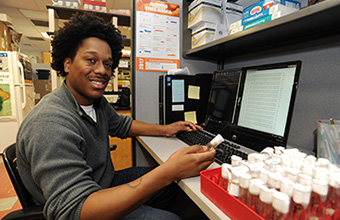College of Arts and Sciences Newsroom

National Science Foundation Fellow
University of Dayton first-year doctoral student Jesse Hughes '16 will mentor minority undergraduate students and introduce them to campus research opportunities after receiving a 2017 National Science Foundation graduate research fellowship.
Hughes, a Cincinnati native who holds a bachelor’s degree in biology from the University, will receive $138,000 in tuition and living expenses over three years while he works to complete a doctorate in biology. He was one of 2,000 award recipients from more than 13,000 applications, according to the foundation.
“This award is going to create opportunities for more students to get involved in the process of research,” said Tom Williams, associate professor of biology, in whose laboratory Hughes works. It is the first NSF graduate research fellowship awarded to the department of biology, Williams said.
Instead of working as a teaching assistant to help support his graduate education, Hughes will perform other activities to benefit the University, students and society. He plans to partner with the University’s Minority STEM Summer Bridge program for incoming minority first-year students majoring in science, technology, engineering or mathematics (STEM). He also hopes to introduce Dayton-area high school students to the world of scientific research.
Hughes arrived at the University in 2012 as a premedical major, but didn’t become aware of the research opportunities available to undergraduates until he changed his major to biology. He was assigned Williams as his academic advisor and soon landed a position in the professor’s lab performing genetics research.
“I feel that is often the story for a lot of students who come into the University as first-generation or minority college students who don’t know these opportunities are available to them,” Hughes said.
Partnering with the STEM Summer Bridge program, which gives minority students a head start on their University experience, will allow him to be an ambassador for undergraduate research, he said.
“It is incredibly influential for the University to be able to provide an example of a student who was able to earn such a prestigious fellowship,” said Aaron Witherspoon, College of Arts and Sciences assistant dean for student success and co-director of the Minority STEM Summer Bridge program.
Witherspoon recalled Hughes as a first-year student and said he was proud of his accomplishments as a scholar, as well as a student engaged in meaningful experiences outside the classroom.
“I think Jesse’s story is also especially powerful in that he has chosen a field in research that is often overlooked by underrepresented racially and ethnically diverse students in STEM,” Witherspoon said. “I look forward to Jesse being able to form mentoring relationships with the STEM Summer Bridge students, as he is a great example of a UD education of learning, leading and serving.”
Williams and Hughes study how evolution used so-called "genetic switches" to develop biological diversity. Last year, Williams received an $839,000 grant from the National Science Foundation to support his research using fruit flies to understand why members of divergent species that share the same genes look and behave differently. The findings could have implications for human health.
The grant, Williams' second from the National Science Foundation since 2012, is one of the largest awarded in recent years to an individual researcher within the College. His lab staff includes two doctoral students and eight undergraduates.
Hughes currently works with two undergraduate research students. Williams now plans to recruit additional undergraduates Hughes to mentor.
After he completes his doctorate, Hughes hopes to pursue a postdoctoral research position and then go on to become a college professor with his own research lab — possibly at the University of Dayton.
“I think that this award is a game-changer,” Williams said. “Not only is Jesse going to be achieving broader societal impacts by helping to diversify our scientific workforce and revealing scientific intellectual merit by his research for the next three to four years, but he is essentially being trained to make a career of this. Jesse will be well prepared to work students into the process of research when he leaves UD, a skill set that will pay dividends for several decades when he is working as a professor.”
The NSF Graduate Research Fellowship program helps ensure the vitality of the human resource base of science and engineering in the U.S. and reinforces its diversity. The program recognizes and supports outstanding graduate students in NSF-supported STEM disciplines who are pursuing research-based master's and doctoral degrees at accredited U.S. institutions.
Since 1952, NSF has funded more than 50,000 graduate research fellowships out of more than 500,000 applicants. Currently, 42 fellows have won Nobel prizes and more than 450 have become members of the National Academy of Sciences. The program has a high rate of doctorate degree completion, with more than 70 percent of students completing their doctorates within 11 years.
- Dave Larsen, communication coordinator, College of Arts and Sciences
